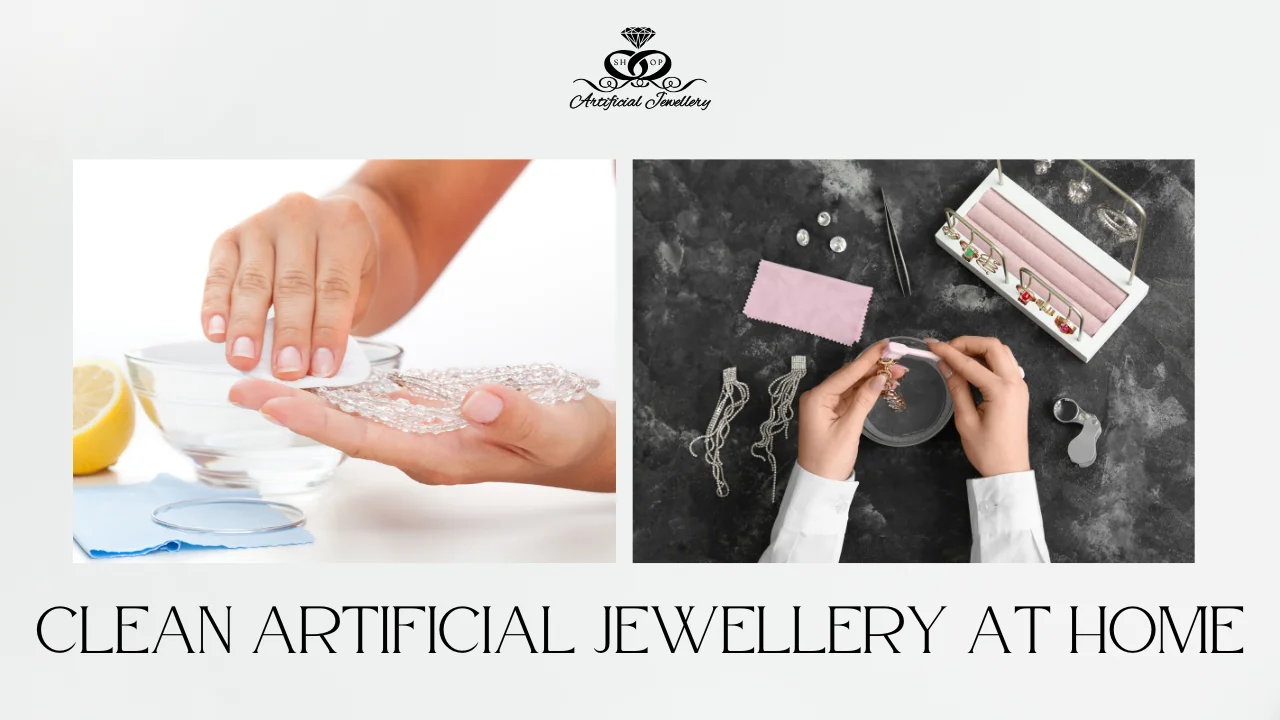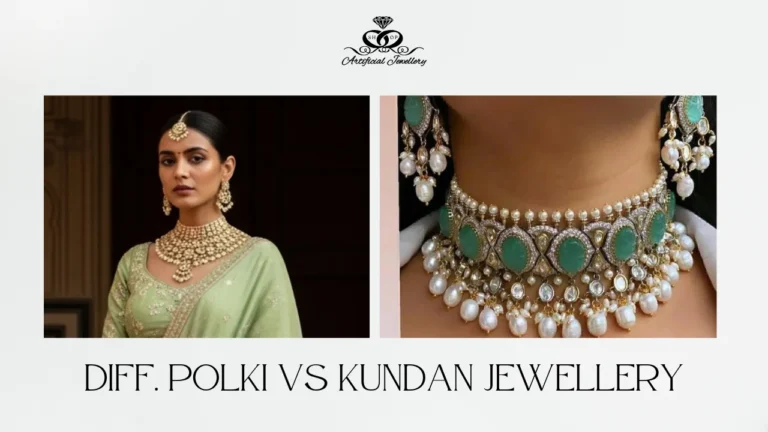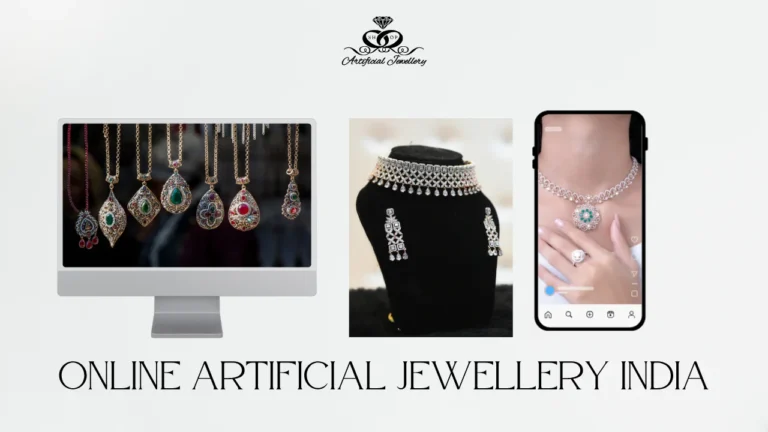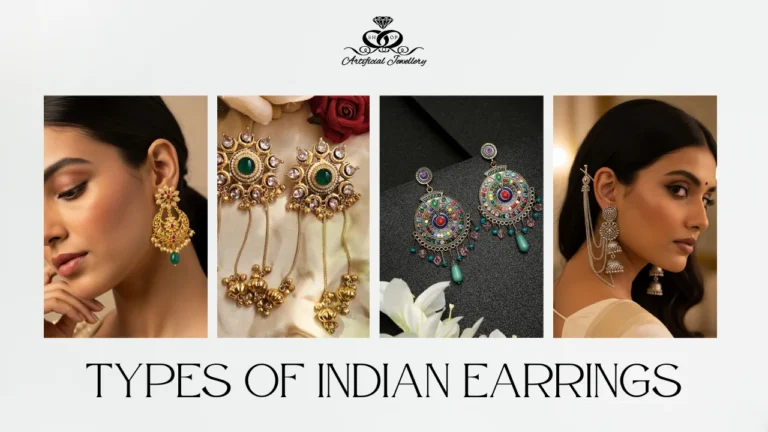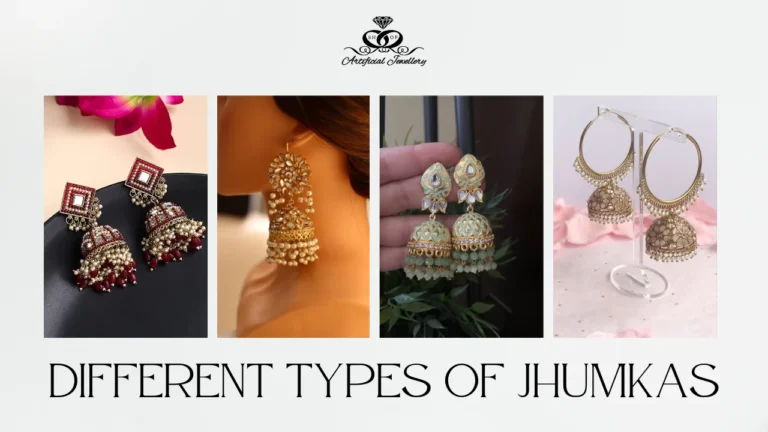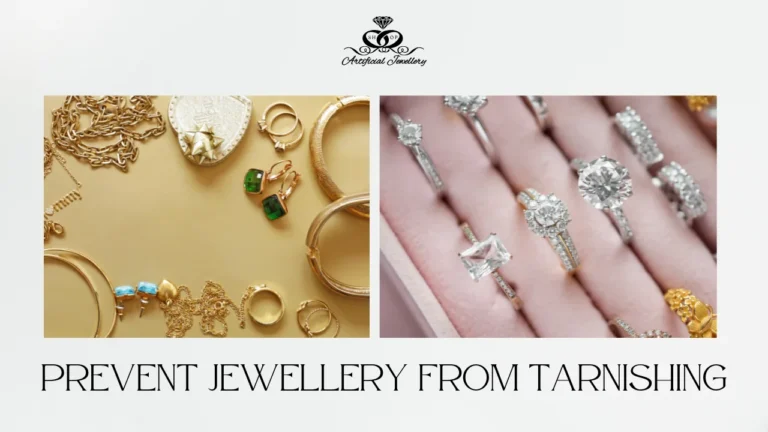Why Regular Cleaning is Important
Artificial jewellery, while beautiful and affordable, is prone to losing its shine over time. Dirt, sweat, oils, perfumes, and air pollutants can cause tarnish or dullness, especially in pieces with intricate designs. Regular cleaning ensures that your jewellery maintains its brilliance and looks as good as new.
Moreover, consistent maintenance helps extend the life of your jewellery. While it may not be made from real gold or diamonds, artificial jewellery still deserves proper care to prevent corrosion, chipping, and discolouration. Especially for frequently worn items like earrings or bangles, regular cleaning keeps them hygienic and presentable.
Precautions Before You Begin
Before you start cleaning your jewellery, always inspect the pieces for loose stones, weak clasps, or chipped enamel. Cleaning fragile items without caution may worsen existing damage. Also, avoid soaking jewellery that has fabric, glued components, or delicate beads.
Always test any cleaning solution on a small, hidden part of the jewellery to ensure it doesn’t cause any discolouration. Use a soft toothbrush, cotton swabs, or microfiber cloths instead of rough materials that can scratch the surface and never mix different metals or finishes when cleaning, as they may react differently to moisture or cleaning agents.
Supplies You’ll Need
For home cleaning, most supplies are items you already have in your kitchen or bathroom. These include:
- Mild dish soap
- Baking soda
- White vinegar
- Soft-bristled toothbrush or baby toothbrush
- Cotton swabs
- A clean bowl
- A microfiber or lint-free cloth
- Toothpicks (for cleaning tiny crevices)
- Lukewarm water
These simple tools and ingredients can safely remove tarnish, sweat residue, and accumulated dust from various types of jewellery like pearls, imitation kundan, oxidised silver, and gold-plated items. For a deeper understanding of the different types and their unique care needs, our guide on types of artificial jewellery explains the materials and finishes you might be working with.
Effective Home Cleaning Methods
a. Soap and Water Method
Perfect for everyday pieces, this method is safe and effective. Mix a few drops of mild dishwashing liquid in a bowl of lukewarm water. Soak the jewellery for 5–10 minutes, then gently scrub with a soft brush. Rinse with clean water and pat dry with a soft cloth.
b. Baking Soda Paste
For heavily tarnished items, especially oxidised jewellery, make a paste with baking soda and water. Apply it gently using a toothbrush, let it sit for 2–3 minutes, and then rinse thoroughly. This method is excellent for lifting tough grime without harming the metal finish.
c. White Vinegar Rinse
Vinegar is a natural cleanser for artificial gold jewellery. Soak the pieces in a mixture of one part vinegar to two parts water for 5–10 minutes. Avoid this for jewellery with glued stones or pearls. After soaking, clean with a soft brush and dry completely.
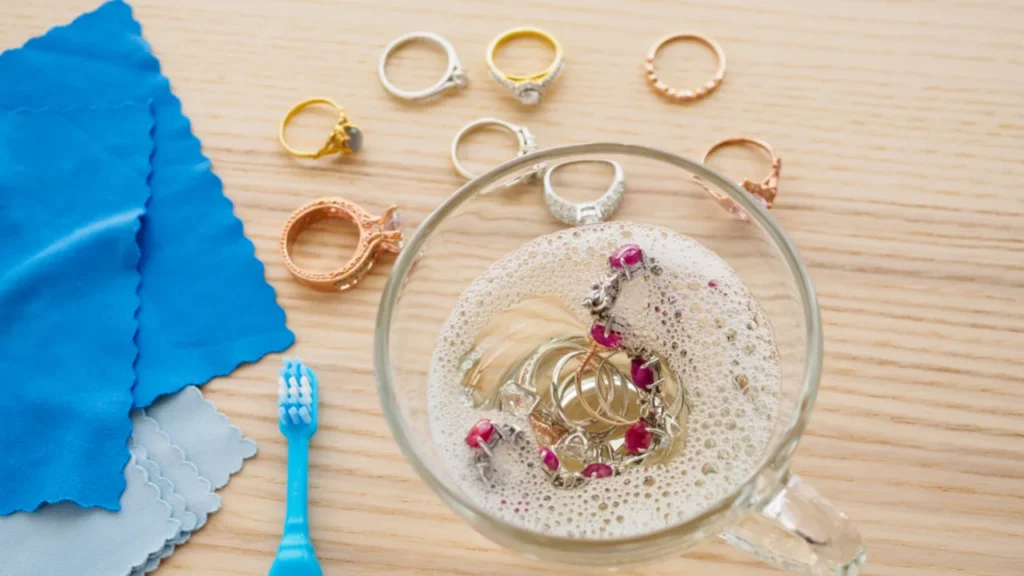
d. Toothpaste Trick
A small amount of non-gel, non-whitening toothpaste can bring back the shine. Apply with a brush and gently clean the item. Rinse off completely and wipe dry. This method works well for CZ stone-studded pieces and glass-based items.
e. Cornstarch Polish
Mix cornstarch with a little water to form a paste. Apply it to the jewellery, let it dry, and then buff off with a soft cloth. It leaves a smooth, polished finish on dull-looking items.
Each method suits different types of jewellery, so choose accordingly based on the material and embellishment.
Cleaning Do’s and Don’ts
Storage Tips After Cleaning
Once your artificial jewellery is clean, proper storage plays a key role in maintaining its shine. Always separate pieces using soft cloth pouches or individual compartments to avoid scratches or tangling.
Use silica gel sachets or activated charcoal in your jewellery box to absorb moisture. This is especially useful in humid Indian climates, where moisture can cause oxidisation and tarnishing. Proper storage ensures that all your favourite affordable artificial jewellery options stay pristine for longer.
When to Avoid Cleaning at Home
While home cleaning is effective for most items, there are times when you should avoid it. If your jewellery features glued stones, enamel paint, or fabric backing, moisture can cause permanent damage. Similarly, antique finishes or handcrafted items may require professional polishing.
Always use judgment before attempting DIY cleaning. If unsure, it’s safer to consult a local jeweller or the seller for maintenance advice. This ensures you don’t accidentally shorten the life of delicate pieces.
Quick Maintenance Tips for Long-Term Shine
- Wipe your jewellery with a soft cloth after each use to remove sweat and oils.
- Apply perfumes, lotions, or makeup before putting on jewellery.
- Avoid contact with water, especially during handwashing or bathing.
- Reserve your best pieces for special occasions and limit exposure to harsh environments.
Consistent care habits reduce the need for frequent deep cleaning. These simple practices will keep your collection looking elegant and ready for any event.
FAQs
1. What household ingredients can safely restore shine to artificial jewellery?
2. Can toothpaste be used to clean artificial jewellery?
Yes, using a small dab of plain white toothpaste (non-gel) with a soft-bristle toothbrush helps remove stubborn stains and dullness. Just be sure to rinse thoroughly afterward and avoid toothpaste on delicate or plated surfaces to prevent scratches.
3. Is vinegar safe for cleaning costume jewellery?
White vinegar diluted with water (typically a 1:1 ratio) can dissolve buildup and bring back shine. However, avoid this method on pieces with glued parts, pearls, or soft stones, as vinegar may weaken the adhesive or damage finishes.
4. What’s the safest way to clean artificial jewellery regularly?
Conclusion
Maintaining the shine and beauty of your artificial jewellery doesn’t require professional help or expensive solutions. With the right techniques and a little care, you can easily clean your jewellery at home using simple ingredients already available in your kitchen. Whether it’s preparing a mild soap solution, trying a gentle baking soda paste, or taking preventive storage measures, these steps ensure your accessories stay radiant and durable over time.
Consistency is key, incorporate these tips into your regular routine, especially after wearing jewellery to weddings or festive occasions. When treated with care, even the most delicate artificial pieces can remain a vibrant part of your collection for years.

